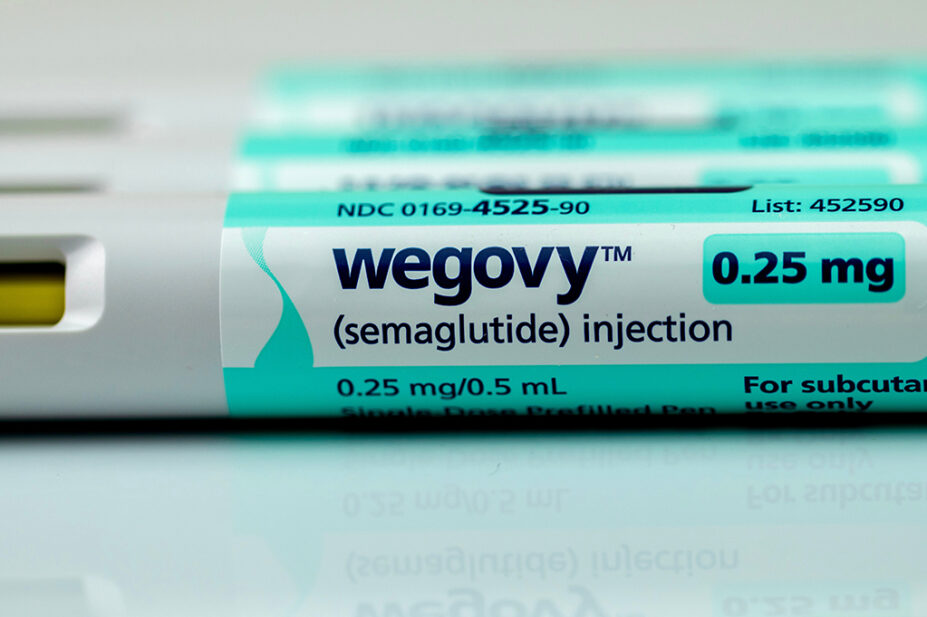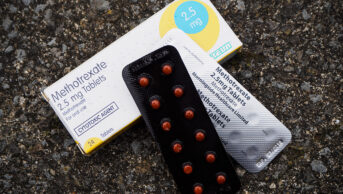
Shutterstock.com
Glucagon-like peptide-1 receptor agonists (GLP-1 RAs) are not linked to suicidal and self-injurious thoughts and actions, a review by the Medicines and Healthcare products Regulatory Agency (MHRA) has concluded.
In an announcement published on 4 September 2024, the UK regulator concluded that available data do not support a causal association between GLP-1 RAs and psychiatric reactions, and advised that “no updates to the product information is warranted at this time”.
GLP-1 RAs are used for managing blood glucose levels in people with type 2 diabetes mellitus and have also been licensed for use in weight loss treatment.
The MHRA review, which commenced in July 2023, was triggered by reports of severe psychiatric reactions — including suicidal ideations, self-harm and depression — associated with the GLP-1 RAs exenatide, lixisenatide, liraglutide, dulaglutide and semaglutide.
In its announcement, the MHRA said its evaluation of post-marketing data in the UK aligned with the conclusions of a comprehensive review by the European Medicines Agency (EMA), published in April 2024.
The EMA review analysed around 150 reports of suicidal thoughts and thoughts of self-injury in people using liraglutide and semaglutide, from sources including post-marketing data, clinical trial data, epidemiological studies and scientific literature.
When the EMA announced its review, there had been 28 reports of the suicidal and self-injurious behaviour associated with semaglutide and 23 reports with liraglutide, as documented in the MHRA Yellow Card reporting scheme.
In its latest announcement, the MHRA added that it will “continue to closely monitor the risk of severe psychiatric reactions associated with these receptor agonists” and “assess new data as [they] becomes available”.
Commenting on the MHRA review, Riccardo De Giorgi, clinical lecturer in the department of psychiatry at University of Oxford, said: “It is reassuring that the MHRA conclusions regarding the safety of GLP1-RAs in terms of suicidality and depression match those of other international regulatory agencies, such as the EMA and US Food and Drug Administration.
“I am aware that a recent investigation — a disproportionality analysis of World Health Organization —records has gathered media attention by reporting once again a possible safety issue with suicide in GLP-1 RA users.
“While this kind of study is important for quickly raising awareness on emerging safety signals from novel pharmacotherapies … it advances a safety concern that we already know and that has been settled by other studies using a more apt design for investigating such a research question,” explained De Giorgi.
In August 2024, a study published in JAMA Network Open found that semaglutide-associated suicidal ideations showed significant disproportionality compared with all other medications and their suspected adverse drug reactions (ADRs; reporting odds ratio 1.45; 95% confidence interval).
Among patients taking antidepressants, suicidal ideation was reported 4.45 times as likely for semaglutide compared with ADRs from all other drugs.
Commenting on the MHRA review, Steve Bazire, honorary professor at the University of East Anglia School of Pharmacy, said: “The 2024 [disproportionality] study was useful as it raised the possibility of a problem that then needs investigating.
“With weight-loss medicines, there are always numerous other factors involved; for example, self-esteem (especially if it doesn’t work), and pre-existing mental health problems (diagnosed or not), that will have an influence on the person’s mental state.
“The MHRA have reviewed all the data, including the August [2024] study … and concluded it is not a real [safety] signal, so I think that, for the moment, that is fine,” said Bazire.
Adam Jameson, clinical pharmacist at Bradford District Care NHS Foundation Trust, said: “While a review by the MHRA is welcomed, more research is required to fully understand the potential psychiatric risks of GLP-1 agonists.
He noted that while the drugs were traditionally used in diabetes populations relatively safely, “their effects in broader populations are still not fully understood”.
“There are concerns, particularly around people with body dysmorphic disorder (BDD) and anorexia nervosa, being inappropriately prescribed Wegovy (semaglutide; Novo Nordisk) via online clinics and whether there are robust enough processes in place to safeguard such patients.”
Amira Guirguis, chair of the Royal Pharmaceutical Society’s science and research committee, said: “The rapid weight loss caused by GLP-1 RAs can potentially intensify body image issues in individuals susceptible to BDD.
“While these medications may improve self-esteem and body confidence for some people, the sudden alterations in appearance could provoke or worsen BDD symptoms, potentially resulting in increased anxiety, depression and suicidal ideation.
“Further research is required to clarify whether these medicines might contribute to psychiatric side effects, especially in patients with a history of depression, anxiety, BDD or emotional eating disorders.”
You may also be interested in

Patient safety commissioner to approach PM over ‘disappointing’ delay to valproate compensation

GPhC writes to pharmacy teams after methotrexate dispensed with instruction to take once daily
